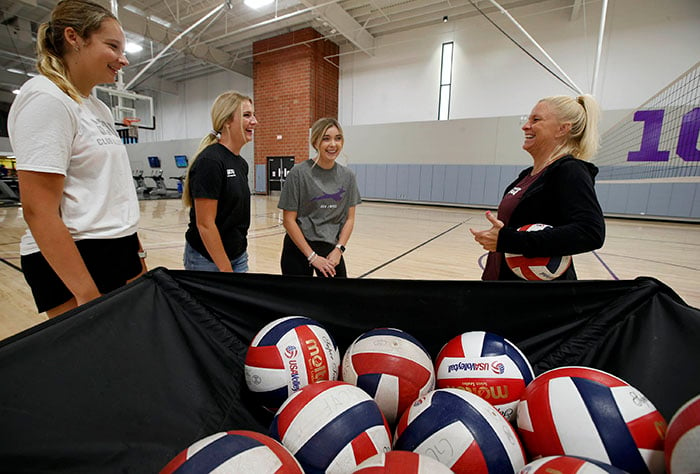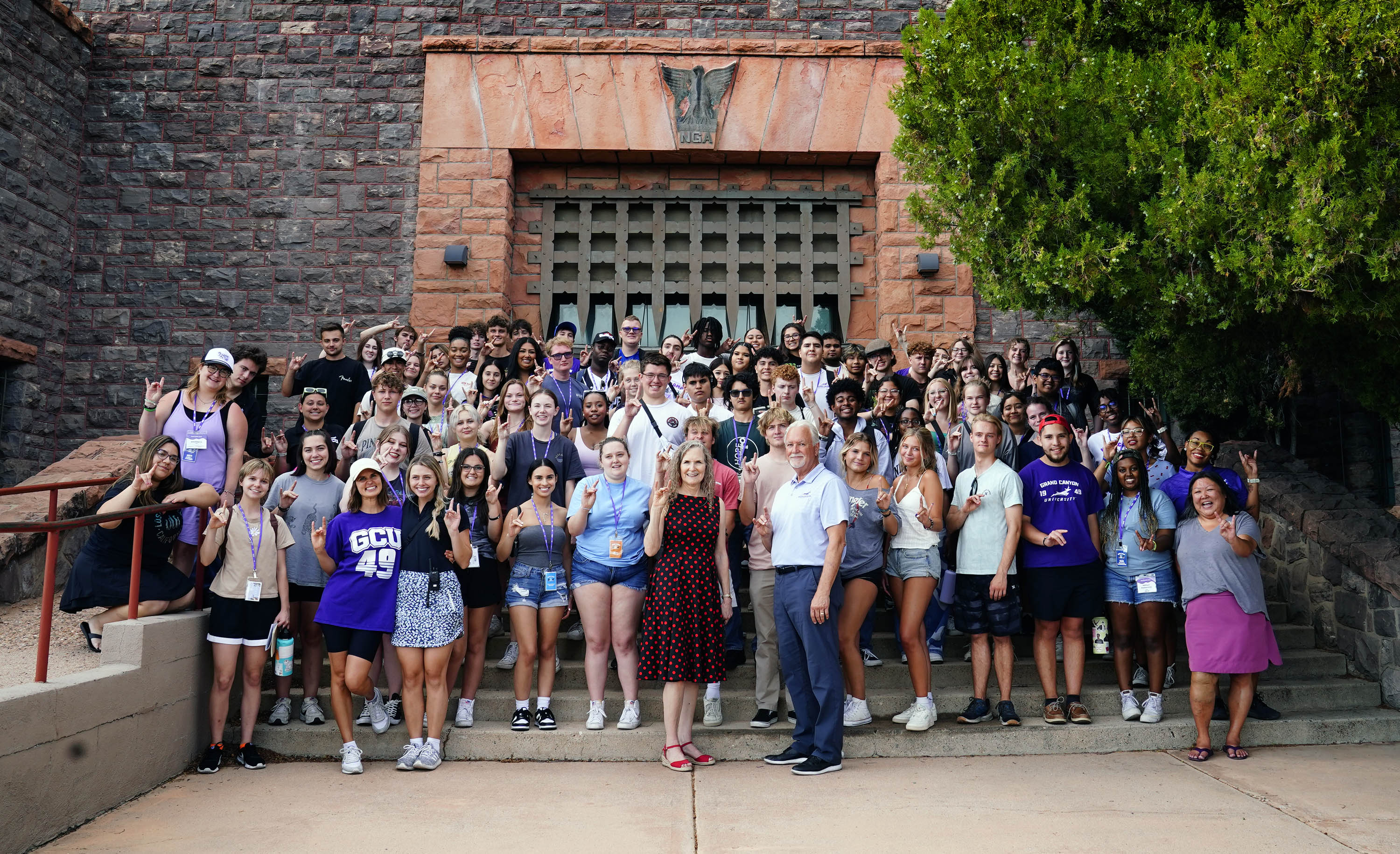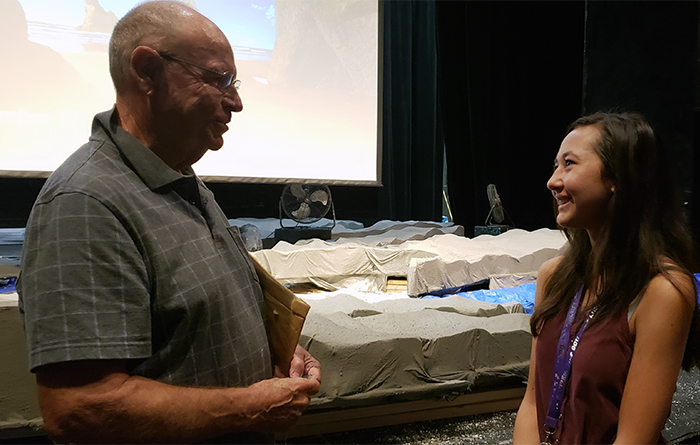
By Lana Sweeten-Shults
GCU News Bureau
B-film fans might have cozied up to “Attack of the Killer Tomatoes.” But Thomas Brodek, who spoke to Grand Canyon University film and television students on Monday in Ethington Theatre, found a certain flight of fancy, instead, in the bee-attack film “The Savage Bees.”
He worked as a co-producer with director Bruce Geller on the 1979 movie – about the horrors that befall Mardi Gras in New Orleans when a swarm of African killer bees escape from a foreign freighter.
“We had to cast the bees,” said Brodek, acknowledging that, yes, it’s an unusual thing to actually cast bees for a film. “And we had to find a bee handler. So what has this got to do with movies? Well, that's what movies are all about. ... We could not film in New Orleans during Mardi Gras. .. We had to close off the French Quarter and had to create our own Mardi Gras. We had to buy out all these shops along the French Quarter because we were stopping the customers from spending money in their store during filming. We had hundreds of extras.”
Then there was that pivotal scene when the bee handler coaxed thousands of bees to land on a Volkswagen Beetle and blanket it. The bee handler took the queen bee out of a tiny box, placed it on the VW Bug and, voila, instant bee-encrusted VW Bug.
“This is the point I'm making: Being in production is not dull and boring. That's it,” said Brodek.
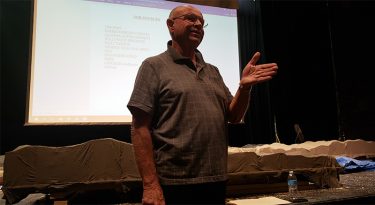
The University of Southern California film graduate has made a career out of TV and film production (including for ABC Productions and Showtime’s “The Tudors” and “The Borgias”), and he recalled that time when a friend of his from Warner Bros. contacted him to help coordinate the “Black Sunday” scene where a blimp landed in Los Angeles Memorial Coliseum at halftime.
Although the scene never was used in the movie, to try to make it happen he had to fly to Akron, Ohio, headquarters for the Goodyear Tire & Rubber Co., which makes the most famed blimp, the Goodyear Blimp, to talk to people in the know. He traveled to the Goodyear landing site in Hawthorne, Calif., where the West Coast blimp was stored, met with the L.A. Coliseum Commission, met with the L.A. Fire and Police departments, then flew to New York to coordinate with the NFL and back to Los Angeles to speak with the Los Angeles Rams organization.
Then he had to budget. It would cost roughly $1.2 million.
“My favorite project would be one so complicated from my life and demanded me to figure out how I would accomplish this,” Brodek said with a smile.
All those logistics is the reason he’s not a big fan of computer-generated imagery. For a producer like him, CGI sucks some of the fun out of his job.
Brodek is now an independent producer – his company is Brodek Productions – and has settled in Wickenburg after working in the industry in Hamburg, Germany, where he headed up the European division of a commercial production company at Studio Hamburg; Studio City and Pasadena, Calif.; and Carefree, where he managed Southwestern Studios.
These days, he uses his logistical skills as a line producer.
"If you don't know what that means, it means I'm a mechanic," he said. "I don't sell. I don't convince major studios or production companies to buy a movie. I wait for the phone to ring."
When the phone does ring, it's a filmmaker who wants to know whom NOT to hire as the director or actor and how long it will take to shoot. Brodek tells them how much a film might cost, where they might film that would financially make sense and if a certain area offers tax credits, for example.
“Lorraine, my partner and best friend and love of 56 years … when we graduated from USC film school 900 years ago, there were only seven major movie studios in L.A. -- seven. There were seven motion picture production companies. There were four television stations and a few other things going on. What you have now are hundreds of possibilities for your career. I really do envy that and want you to be excited about that,” Brodek said.
Students delving into film and television can even work from Phoenix if they want, he said, and maintain that creative process via Skype meetings, emails and the like.
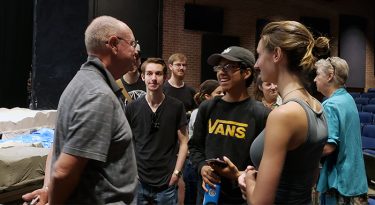
“One of the great things about your opportunities is that the world is now flat. It's not round anymore,” he said. “The telephone and the internet have flattened my life, which for me is very exciting because now we can have a meeting from my home with someone in Budapest, and we can be on Skype, and we can see each other, and we can discuss things and get to know each other. That's fabulous and I LOVE that.”
But he emphasized: “The problem with that is it still goes back to the old saying, 'You can’t see eye to eye unless you’re face to face.' So there's nothing that can take the place of actually sitting in front of somebody and talking to them and having them talk to you.”
He added that while film and TV students can work in the industry from anywhere, they have to realize there might be some disadvantages working far from Hollywood or New York.
"That shortens and smallifies your career, but that's OK," he said. "At least it's home, and there are television stations and a few production companies that might be interested in you and you in them. But just understand that that's not going to look as broad on your resume or CV (curriculum vitae). If you really want a big career, then you really need to look into Los Angeles."
Brodek said students should connect with job sources, such as Cynopsis, Entertainment Careers, Ladders, the Hollywood Reporter, the Directors Guild of America, the Academy of Motion Pictures Arts and Sciences and the like, many of which are free-of-charge sources for jobs. If they’re not, those publications and organizations might offer a student rate – or even waive the fee.
The Directors Guild of America sends out notifications, for one, that are “invaluable.” He said information from The Beverly Hills Bar Association might seem odd, but it's been vital to him as a producer. Usually the lawyers in the entertainment industry "get the first indication on their desk that a project seems to be coming together because all the people in the production company and in the networks and major studios go to the lawyers to have them figure out if they can make a deal on this."
He told students to have their curriculum vitae ready and, while he loves email, “there is nothing to replace sending someone in the mail your CV and a cover letter saying I want a job, I need a job because I'm terrific, because of my experience. This is what I want to do in life. This is what I believe in. I believe in mailing it to them in a big, heavy envelope, not one of those little legal envelopes that you see, but a big, heavy envelope because it's more likely they'll open it. Send it registered mail -- yes, it costs you more money -- and a return receipt requested, which means they are forced to sign a document to say they've got it. That has always worked great for me.”
He advised students to ask if they need a favor in the industry: “If you don’t ask, you don’t receive. … Go to the general manager wherever you're trying to film and say, 'Hi, we want to do this movie here, and we're not going to mess anything up, and we have insurance. We're well behaved. Here's a copy of my Code of Conduct.' … Don't be afraid because people can turn around and say, 'I didn't realize, no problem.'"
He also said it’s not necessarily whom you know but when you know them: “These people change jobs, and I’m making this up every 18 months.”
Some other advice:
- If you make a mistake, be the first person to own up to it. If you own up to it and tell your boss the solution you came up with, it’s likely you won’t get fired.
- Your mom was wrong about not talking to strangers. “I’ve learned more from talking to strangers than talking to people I know,” Brodek said. “So, sorry, Mom, I talk to strangers.”
- Take at least one law class and one general business class so you’re at least familiar with the vocabulary. Television and film isn't just about acting and writing. It's also about legal and business documents.
- “My father told me, ‘Take a course in salesmanship.’ … Getting the vocabulary and awareness of salesmanship is very, very important.’”
- He pointed students to programs such as MovieMagic, which helps with movie budgeting, and www.nofilmschool.com, which he said is “just absolutely wonderful.”
- Once you do get a job, get your name on the daily production report and the call sheet. Brodek was able to join the Directors Guild by walking in and presenting the organization with copies of the production reports with his name on it. "With that list of experience, the Directors Guild voted me in as a member."
- Keep up with the Arizona Office of Film and Digital Media: "You should get your CV or resume out to (Director) Matthew Earl Jones right away if you're really looking for a job."
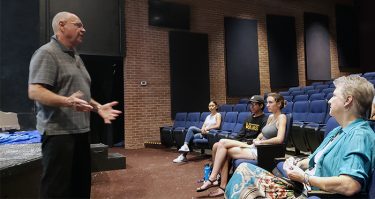
At the end of Brodek’s talk, one student asked, “How do you decide who shouldn’t be hired?”
Brodek said he does his homework, calls assistant directors and others in the industry who could convey information about a certain director, for example, and if that director might not have shown up to work when they should have or caused a film to fall way behind schedule. He tries to find out if a particular cast member under consideration has been to rehab nine times. He gets his information from multiple sources and told students the idea is to "take that information off your shoulders and take it back to the production company."
Another student wanted to know how he got started in the industry.
“I wanted to be a television director on a series. In those days, the series weren't owned by the studios or the production company. The series was owned by the advertiser,” he said, such as “My Three Sons,” which was run by Hunts Foods and Industries and its advertising agency, Young & Rubicam.
So he started his career working for an advertising agency, including seven years as president of the European operation of that company: “I learned more in television commercial production than I did in anything else because we were shooting one, two, three days every week. I had experience in filming 32,000 feet above sea level, at 200 feet below sea level. I shot in 130-degree heat in Death Valley, and I shot in 60 degrees below. So over those years, it gave me an incredible line of experience."
After moving back to California, he attended industry workshops, where he broadened his friendships and relationships and ended up landing a job with a major production company. "That's when everything came together," he said.
Lisa Tervo, Chair of GCU's Department of Digital Film Production, said the department brings in speakers often, about once a month, to meet with students.
“It’s to help students network outside of faculty,” she said, adding, “If you just make films for yourself during your time here, then you might as well have not been here.”
Brodek didn't limit himself that way in his career. As he said, "Being in production is not dull and boring. That's it."
Contact GCU senior writer Lana Sweeten-Shults at lana.sweeten-shults@gcu.edu or at 602-639-7901.



